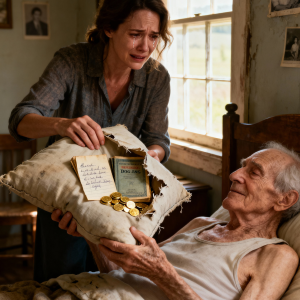
When Vincent Moreau stepped through the doors of his lakeside villa earlier than usual, he expected silence and polished marble floors. Instead, he froze at the sight before him: his son, Thomas, carefully lifting one leg after another with the help of Isabel, the young housekeeper. She knelt beside the boy, holding his shoulders steady, whispering words of encouragement. For years Vincent had buried himself in business, believing wealth could shield his family from pain. Now, watching his son struggle and smile at the same time, he felt something inside him stir for the first time in years.
That evening, after Thomas had fallen asleep, Vincent sat across from his wife, Marguerite. She hesitated, then spoke quietly. “Vincent, I need to be honest. I thought about divorcing you.”
His face turned pale. “You were going to leave me?”
“I was lonely. It felt as though I raised Thomas by myself while you lived for your company. I couldn’t continue like that. But tonight, when I saw you watching him with tears in your eyes, I saw the man I once married.”
Vincent reached for her hand. “I almost lost the only two people that matter. I won’t make the same mistake again.”
Weeks passed. Vincent returned home early more often, always finding Isabel in the garden or living room, encouraging Thomas through small exercises. One afternoon he discovered her sitting alone, wiping away tears. “Isabel, what’s wrong?”
She shook her head. “It’s nothing, monsieur.”
“Please tell me.”
With reluctance, she explained that a visiting acquaintance of Marguerite had insulted her, calling her a servant who didn’t know her place and mocking the way she treated Thomas as if he were her own child. What hurt most was that Thomas had overheard. The boy, usually quiet, had defended her fiercely.
Vincent’s chest tightened with both pride and anger. “No one speaks to you like that again,” he told her firmly. “You are part of this household, Isabel.”
Marguerite agreed, confronting her so‑called friend and making clear that respect was non‑negotiable. From then on, Isabel was treated not as hired help but as a trusted companion.
Yet challenges arrived. A rival industrialist contacted Vincent, attempting to lure Isabel away with a lavish salary and benefits to care for his disabled grandson.
Isabel was torn. “The offer would change my family’s life,” she admitted. “My mother could finally rest, my brother could finish his studies. But I can’t bear the thought of leaving Thomas.”
Vincent studied her face. “Do you enjoy working here?”
“I do. More than I ever imagined.”
“Then let me match the offer, with added support for your family. You have given us far more than we could repay. Stay, Isabel. Thomas needs you.”
Tears filled her eyes as she nodded. “I will stay.”
Months later, Thomas managed something extraordinary.

During his morning practice, he let go of his crutches and took several steps, then another, then broke into a small run across the lawn.
“Papa! Isabel! I’m running!” he shouted. Both adults rushed to him, their hearts overflowing with pride. “My champion,” Isabel whispered, embracing him. “You proved that nothing is impossible.”
The breakthrough changed everything. At his kindergarten graduation, Thomas walked confidently to the stage and spoke in a clear voice about the woman who had believed in him when he didn’t believe in himself. In front of a hall full of parents, he declared that Isabel was not a servant but family. The audience erupted in applause as Vincent and Marguerite joined him on stage.
For the first time, the three of them embraced Isabel publicly as one of their own. The idea for something greater was born that night. Parents approached Isabel, eager to learn her methods.
Vincent turned to Marguerite and whispered, “What if we opened a therapy center, with Isabel as its heart?”
wo years later the Saint‑Claire Center for Children opened, led by Isabel, now a certified pediatric physiotherapist. Thomas, healthy and full of energy, cut the ribbon on opening day, his story inspiring dozens of families.
Not long after, Vincent received a surprising call from his old rival. “Your center changed my grandson’s life,” the man confessed. “I was wrong to see Isabel as just an employee. She belongs exactly where she is.”
That evening Vincent walked through the same garden where everything had begun. Thomas, now more confident, raced across the grass to greet him. “Father, do you think every family has someone like Isabel?”
Vincent smiled, remembering the woman who had entered their home with quiet determination and transformed their lives. “Perhaps not every family is so lucky,” he replied. “But every family can choose to be that someone for another.”
As the sun dipped below the horizon, Vincent watched Thomas laugh with Isabel and Marguerite. He realized that true fortune had nothing to do with stocks or estates. It was measured in love, in second chances, and in the courage of a boy who once believed he could never run but now ran straight into the arms of the people who believed in him first.



